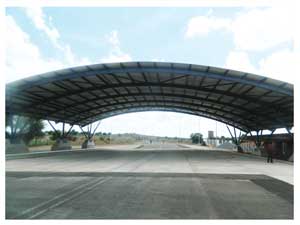
SADC accreditation for metrology lab

From left: Mr. Riundja Kaakunga, CEO of the Namibian Standards Institution, Mrs. Maureen Mutasa CEO of the Southern Africa Development Community Accreditation Service (SADCAS), Hon. Calle Schlettwein, Minister of Trade and Industry, and Dr. Martha Kandawa-Schulz, Chairperson of the Namibian Standards Council, the NSI’s governing board.
The official accreditation certificate was handed to the Namibian Standards Institution on the day Namibia joined the international community in commemorating World Metrology Day on 20 May.
The Minister of Trade and Industry, Hon. Calle Schlettwein said World Metrology Day raises awareness of the importance of accurate, reliable and internationally accepted measurements in everyday life. He explained that Namibia’s national quality infrastructure, which includes Metrology, is a necessary prerequisite for the protection of the consumer and facilitation of trade and regional integration.
“Cabinet in 1999 adopted the National Quality Policy (NQP) which places Namibia amongst the very few countries which have a NQP” he said adding that the work the NSI performs is complementary to the programmes of the ministry.
In her speech, Dr. Martha Kandawa-Schulz, the Chairperson of the Namibian Standards Council (NSC), the governing board of the NSI, highlighted the significance of such an achievement to the wider Namibian economy.
“It is important to underscore that the inability to comply with market requirements and a lack of internationally accepted local proof of compliance restricts the ability of many developing countries to attract inward investments. Therefore, the accreditation of the NSI Metrology Laboratory is an important milestone not only for the NSI but also for the Namibian economy as a whole as it creates confidence in the calibration certificates issued by the NSI Metrology Laboratory.” Dr Kandawa-Schulz said.
Riundja Kaakunga, the NSI CEO, said that the NSI is a product of Namibia’s national quality infrastructure which was developed by the Ministry of Trade and Industry in 1996 culminating in the National Quality Policy in 1999, and the NSI in 2007.
“On 25 November 2005 when the South African Bureau of Standards (SABS) regulatory arm, which was the official technical inspection body that used to certify Namibia’s fish and fisheries products, notified the government that it would withdraw and hand over the regulatory function to the Namibian authority.
As a consequence of that development, Cabinet directed that the NSI should be established and that the necessary mechanisms be set up to ensure the continued functioning of the regulatory controls over food safety, wholesomeness and compliance of Namibian fish and fisheries to national legislation and international practice.” he said.
“The NSI Food Laboratory and Fisheries Inspection at the Testing and Inspection Centre in Walvis Bay is accredited to the ISO/IEC 17025 international standard since 2008 and competently conduct microbiological tests and hosts the country’s first ever Marine Accreditation Biotoxins laboratory.
Maureen P Mutasa, the CEO of the SADC Accreditation Service (SADCAS) said the certificate which was issued on 20 February 2013 is valid for 5 years until 19 February 2018.












































